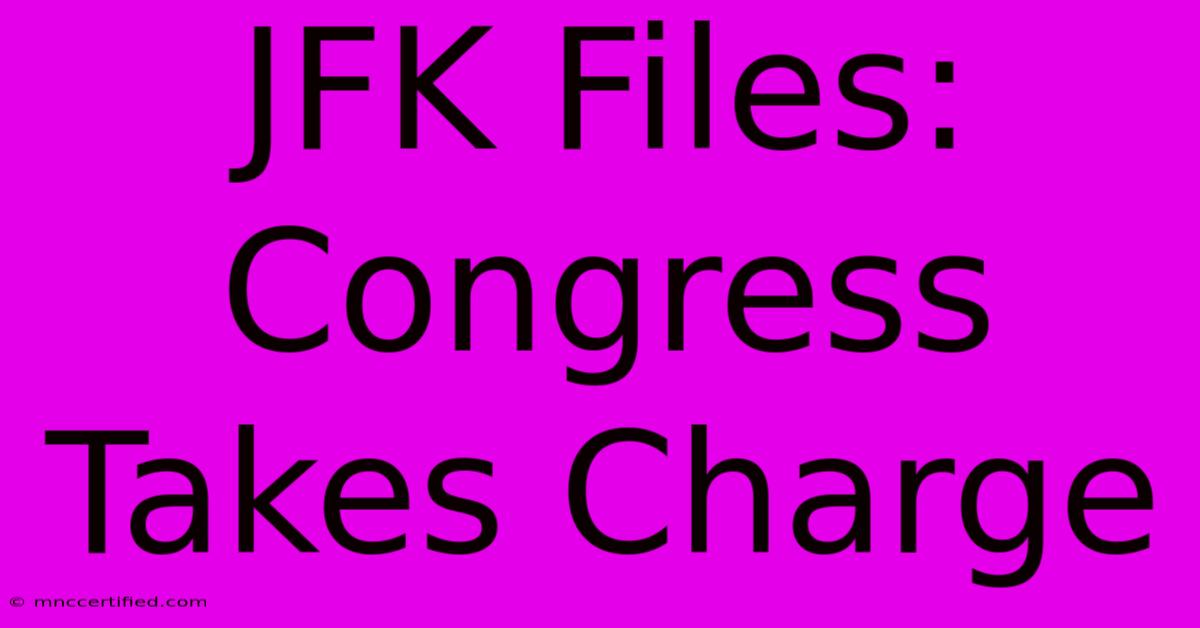JFK Files: Congress Takes Charge

Table of Contents
JFK Files: Congress Takes Charge – A New Chapter in the Assassination Mystery
The assassination of President John F. Kennedy remains one of history's most enduring mysteries. Decades after the tragic event, the quest for truth continues, fueled by unanswered questions and lingering suspicions. Recently, Congress has taken a more active role in shedding light on the events surrounding JFK's death, igniting renewed interest and debate. This article delves into the latest developments, exploring Congress's involvement and its potential impact on the ongoing investigation.
The Long Shadow of the JFK Assassination
The November 22nd, 1963, assassination of President Kennedy in Dallas, Texas, shocked the world. The Warren Commission's findings, while officially concluding Lee Harvey Oswald acted alone, have been met with skepticism for decades. Numerous conspiracy theories have emerged, ranging from involvement of the CIA and the Mafia to the Soviet Union. This persistent questioning underscores the profound impact the assassination had and continues to have on the American psyche. The JFK files, a vast collection of documents related to the assassination, have been a central point of contention and scrutiny.
The Presidential Records Act and the Release of Files
The Presidential Records Act of 1978 mandates the release of presidential records after a certain period. However, the process has been fraught with delays, redactions, and controversies. Over the years, various presidents have invoked national security concerns to withhold sensitive information, leading to accusations of cover-ups and obfuscation. This has fueled public demand for transparency and accountability.
Congress Steps In: A Renewed Push for Transparency
Congress, sensing the public's dissatisfaction with the slow pace of declassification and the continued ambiguity surrounding the assassination, has stepped in to exert its influence. Several legislative initiatives have focused on ensuring the full release of JFK-related documents and improving the declassification process. These actions represent a significant shift in the handling of this sensitive historical matter, signaling a determination to overcome past obstacles to transparency.
Congressional Hearings and Investigations
Recent congressional hearings have focused on specific aspects of the assassination, examining previously unreleased evidence and interviewing key witnesses. These hearings have provided a platform for experts, historians, and researchers to present their findings and challenge existing narratives. The televised nature of these hearings has also increased public awareness and engagement, fostering a renewed national conversation about the JFK assassination.
Legislative Pressure for Full Disclosure
Congress is utilizing its legislative power to pressure the executive branch to release the remaining classified documents. The introduction of bills that mandate the complete declassification of all relevant materials demonstrates a clear commitment to transparency and accountability. This legislative pressure is a crucial component of the ongoing effort to unravel the mysteries surrounding the assassination.
The Implications and the Future of the JFK Files
The increased congressional involvement in the JFK files represents a significant development in the ongoing quest for truth. The potential implications are far-reaching. A full and transparent release of all documents could potentially:
- Resolve lingering questions: Address unanswered questions about the assassination and potentially debunk conspiracy theories.
- Reinforce public trust: Demonstrate a commitment to government transparency and accountability.
- Advance historical understanding: Provide a more complete and accurate understanding of this pivotal moment in American history.
However, there are also potential challenges. The release of sensitive information might compromise national security, raising concerns about the balance between transparency and security. Careful consideration and a well-defined process are crucial to navigate these complexities.
Conclusion: A Turning Point?
Congress taking charge of the JFK files marks a potential turning point in the long and complex history of investigating the assassination. While challenges remain, the increased legislative pressure and public scrutiny signal a renewed commitment to uncovering the truth. The coming years will be crucial in determining whether this increased congressional involvement ultimately leads to greater transparency and a more complete understanding of one of the most enduring mysteries of the 20th century. The ongoing pursuit of truth surrounding the JFK assassination underscores the importance of historical accuracy and the enduring public interest in this pivotal event. The future of this investigation remains uncertain, but one thing is clear: the search for answers continues.

Thank you for visiting our website wich cover about JFK Files: Congress Takes Charge. We hope the information provided has been useful to you. Feel free to contact us if you have any questions or need further assistance. See you next time and dont miss to bookmark.
Featured Posts
-
25 Crypto Terms You Should Know
Nov 23, 2024
-
Return To Paradise Cozy Winter Film
Nov 23, 2024
-
Mewtwo Funko Pop Pokemon Center
Nov 23, 2024
-
Wicked Uk Ireland Box Office Preview
Nov 23, 2024
-
Stability In Bonding Answer Key
Nov 23, 2024